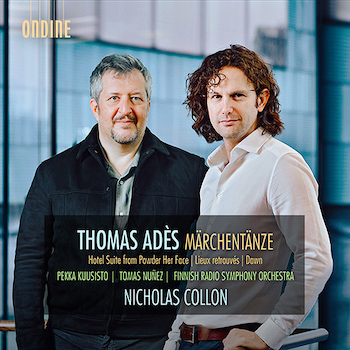Classical Album Review: Thomas Adès’s Tuneful “Märchentänze”
By Jonathan Blumhofer
As the composer moves from youth to middle age, Thomas Adès is unique among his contemporaries for his singular embrace of melody, harmony, and form.
 Thomas Adès, tunesmith? On the merits of Märchentänze, a collection of recent pieces (or arrangements) for orchestra, yes, indeed.
Thomas Adès, tunesmith? On the merits of Märchentänze, a collection of recent pieces (or arrangements) for orchestra, yes, indeed.
That’s not to say that Adès has lost any of his patented originality or gift for abstracting the daylights out of anything he lays his hands on; he still does both with fervor. But, as the composer moves from youth to middle age, Adès is unique among his contemporaries for his singular embrace of melody, harmony, and form.
In Märchentänze, that comes out in each of the album’s four selections.
Certainly one expects as much from the “Hotel Suite” from Powder Her Face. The latest distillation of set pieces from Adès’s 1995 opera, this version is a vast improvement on the overlong “Luxury Suite” from 2017. Now, there are just five movements: the woozy Overture; lush, Berg-ish “Scene with Song”; dour “Wedding March”; pulsing, mysterious “Waltz”; and frolicking Finale.
As played by the Finnish Radio Symphony Orchestra (FRSO) led by Nicholas Collon, it’s a doozy of a piece. The ensemble navigates the score’s rhythmic challenges with aplomb, as well as color: their performance is at once richly blended and stylish. Throughout, the reading is wonderfully balanced, Collon ensuring the distinction between contrapuntal and accompanimental figures in the “Scene” as well as drawing moments of real menace from his band at the “Waltz’s” sinister climaxes. Above all, it sings, as much in the Overture’s deliriously sensuous tango figures as in the swooning refrains of the “Song.”
Much the same goes for the collective’s performance of Adès’s orchestration of Lieux retrouvés, originally a 2009 cello-and-piano piece. Here, delicacy — the textures of “Les eaux” float — and irony (“La ville – cancan macabre” is deliciously playful) are tied together by lyricism. Cellist Tomas Nuñez delivers an account of the solo line that’s at once warm and flowing (the unaccompanied “Les champs” soars) and snapping.
Similarly captivating is the title track. In it, violinist Pekka Kuusisto plays with breathtaking technique: take your pick from the flexibility of his performance in the opening movement, the understated warmth of his tone in the second, the soaring figurations in “A Skylark for Jane,” or precisely stumbling phrases in the concluding reel. Any way you cut it, this is some marvelous fiddling.
But what truly makes it great is how the violinist never sacrifices the music’s melodic impetus to its technical demands; rather, Kuusisto’s is a performance that flawlessly balances the two. Collon leads an accompaniment that consistently embraces Adès’s conception of musical space, especially in the gossamer-textured first movement.
A related kind of atmosphere is explored in Chacony. Written during the first summer of the pandemic, the piece is more a study of sonority than of thematic development: indeed, the melodic materials are repeated rather than refined. Even so, the repetitions contain enough by way of tonal variety to remain of interest, and they’re always judiciously voiced; the ending comes as a moment of brilliant release.
As elsewhere, the FRSO’s performance here is warm and beautiful, a bit less thrilling, perhaps, than the Los Angeles Philharmonic’s premiere performance from 2020 (alas, unavailable), but altogether winning.
Jonathan Blumhofer is a composer and violist who has been active in the greater Boston area since 2004. His music has received numerous awards and been performed by various ensembles, including the American Composers Orchestra, Kiev Philharmonic, Camerata Chicago, Xanthos Ensemble, and Juventas New Music Group. Since receiving his doctorate from Boston University in 2010, Jon has taught at Clark University, Worcester Polytechnic Institute, and online for the University of Phoenix, in addition to writing music criticism for the Worcester Telegram & Gazette.
Tagged: Finnish Radio Symphony Orchestra, Märchentänze, Ondine, Pekka Kuusisto
